When All Else Fails, Try Entrepreneurship
Ohad Elhelo ’16, IBS MA’17, has created a novel program that encourages Israelis and Palestinians to launch joint business startups. Its ultimate goal: incubating peace in the Middle East.
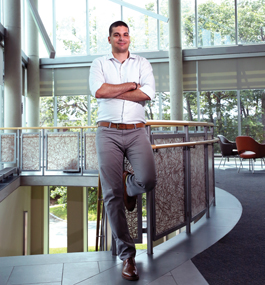
Mike Lovett
Ohad Elhelo ’16, IBS MA’17
by Joseph Dorman
Lobna Agbaria, a preternaturally poised young woman from Tel Aviv, stands on a stage in downtown Boston talking about real estate.
Homebuyers in Israel have to navigate a maze of state bureaucracies to obtain relevant information about properties for sale, she tells the high-powered CEOs, hedge-fund managers and investors who have gathered to listen to her. The red tape, she says, is hobbling the region’s real estate market.
Agbaria has a solution: SnapLand, a mobile app and website that instantly displays comprehensive property profiles, could expand the homebuyers’ market by streamlining the information process. Her audience looks intrigued. When she explains that SnapLand will, for the first time, make all this information available in Arabic as well as Hebrew, their interest is piqued even more.
A Palestinian citizen of Israel, Agbaria grew up in the southern Israeli city of Be’er Sheva. Her parents, who come from poor families in northern Israel, are academics who met as students at Ben-Gurion University. Agbaria is a lawyer. She handled real-estate cases at a Jewish Israeli law firm before starting her own firm in Tel Aviv.
Her business idea, SnapLand, is one of seven potential startups being pitched to Boston’s financial elite today. It’s Venture Selection Day — a high-stakes event in a remarkable new fellowship program and business incubator at Brandeis called Our Generation Speaks (OGS).
Launched last year, OGS partners with the Heller School for Social Policy and Management, and MassChallenge, a startup accelerator with headquarters in Boston. In June, the second cohort of OGS fellows, 21 to 30 years old, arrived on campus. They had been selected through a rigorous application process (500 people vied for 24 spots) that makes no bones about its pursuit of equality: 12 Jews and 12 Palestinians were chosen from Israel, the West Bank and Gaza, equally divided between men and women.
During a three-month summer residency at Brandeis, the fellows learn about entrepreneurship and create joint Israeli-Palestinian startups, working, socializing and living together in a spirit of friendship and professionalism. For some, it is their first positive engagement with the other side.
OGS is the brainchild of 27-year-old Ohad Elhelo ’16, IBS MA’17, a Jew born in Ashdod, Israel. He came to Brandeis as a sophomore in 2013 on a Slifka Scholarship, awarded annually to one Arab Israeli and one Jewish Israeli committed to advancing coexistence in Israel.
An economics major, Elhelo was also earning a master’s in international economics and finance at Brandeis International Business School when he developed the idea for OGS in 2014. “I spent two years in the U.S. as well as in Israel and Palestine, carefully building a network in which there would be a one-to-one ratio of Jews and Palestinians on every level — fellows, mentors and board members,” he says. OGS continues to strive for parity among its mentors and board members.
Elhelo is committed to ensuring absolute equality between the Israeli and Palestinian communities. It’s the only way to bring them together, he says.
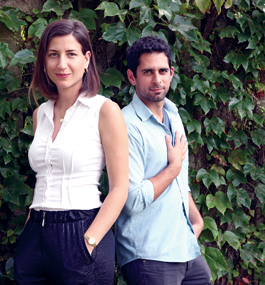
Mike Lovett
Lobna Agbaria and Or Naor, SnapLand
page 2 of 5
‘An infrastructure of hope’
Elhelo is an unusual combination — a dreamer with an iron will and a practical savvy beyond his years. Since 2014, he has raised $4 million in support of OGS. In November, he was named to the 2018 Forbes 30 Under 30 list, under the "Social Entrepreneurs" category. And his charisma and smarts have helped him win the backing of powerful sponsors like former Massachusetts Governor Deval Patrick and Robert Kraft, the billionaire business leader and New England Patriots owner.
Patrick and Kraft first met Elhelo at a donor-appreciation event organized by CJP (Combined Jewish Philanthropies). Elhelo was the warm-up act that day, followed by Kraft and Patrick, who were taken by what the Israel Defense Forces veteran had to say. Elhelo talked about building “an infrastructure of hope” in the Middle East. “When it was our turn, we both ended up talking about him,” Patrick recalls.
And they both joined Elhelo’s cause. Kraft has given OGS more than $1 million and opened doors to other funders. Patrick became chairman of the OGS advisory board.
Brandeis President Ron Liebowitz is also a key supporter. “We are hopeful that this innovative program, based here at Brandeis, will yield benefits for the Middle East region,” says Liebowitz. “As an institution established by the American Jewish community the same year the State of Israel was founded, Brandeis plays a special and unique role in higher education. By bringing together talented young entrepreneurs from Israel, the West Bank and Gaza, we can put our strength to work for the region.”
Ultimately, OGS seeks to promote peace through shared prosperity, building lasting relationships and mutual trust among those who join the program. “In future peace talks, our alumni might find themselves negotiating on opposite sides of the table, and they’ll know they can trust one another,” Elhelo says.
He points to the controversial but successful Iran nuclear deal negotiated under President Barack Obama. Key negotiators for each side — Ali Akbar Salehi, the head of Iran’s Atomic Energy Organization, and former U.S. Secretary of Energy Ernest Moniz — were at MIT at the same time, Moniz as a young professor and Salehi as a graduate student. Though they didn’t know each other then, they found their common background connected them. “Their discussions outside the formal negotiations were really important to the deal,” Elhelo says. “If you trust a person, much can happen.”
In the same way, OGS’ influence is amplified by its small but growing alumni network. Each new class of fellows enlarges the force of smart, experienced and driven individuals on both sides determined to end the Israeli-Palestinian conflict. If OGS alumni enter politics, they will know there are people they can talk to and trust on the other side.
 |
|
Sidebar Story |
 |
“We cannot change the mentality of the political leadership on each side in five years,” Elhelo explains. “But in 15 or 20 years, there can be real change.”
Elhelo’s attempt to map out a better, more economically integrated and peaceful future has struck a powerful chord with his peers, who grew up in the shadow of the failed Oslo Accords. Their childhoods were marked by aborted peace talks, the Second Intifada of suicide bombings that traumatized Israeli society and the subsequent construction of the Israeli security wall that infuriated Palestinians. Israel’s decision to pull out of Gaza in 2005 led to the rise of a radical Hamas-led government in the strip and two wars that left deep scars on both sides.
“Our generation,” says Elhelo, has “little faith in the political process and in political leaders.”
Elhelo served as a lieutenant during the July 2014 war in Gaza. Though his assignment as an intelligence officer kept him outside the battle zone, he lost friends in the fighting. He was also keenly aware of the pain felt by the other side and its devastating effect on prospects for future reconciliation. “The 5-year-old kid in Gaza whose house is destroyed doesn’t care whose fault it is or who shot first,” Elhelo says. “He cares that he has no home, and, in the end, he’s not likely to grow up to be a peace activist.”
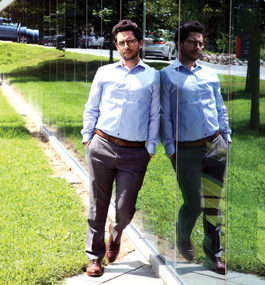
Mike Lovett
Sinan AbuShanab
page 3 of 5
For many young Israelis and Palestinians, the defining encounter between the two communities happens when an Israeli soldier confronts a Palestinian in the West Bank or at an Israeli military checkpoint. For the Palestinian, it’s a humiliating and angering experience. For the Israeli, it’s a challenging responsibility that comes with being part of a policing military force.
OGS program manager Sinan AbuShanab, a Palestinian who grew up in Bethlehem, remembers not only the death of a neighbor active in the PLO’s fight against Israel but a school friend killed by a stray bullet from a nearby house where Israeli soldiers were setting up a checkpoint. The constant conflict breeds fear and suspicion on both sides, creating what Elhelo sees as “a vicious cycle” of distrust.
Cooperation eclipses conflict
Imagine, then, how powerful it is to observe Elhelo and AbuShanab working intimately side by side. Their discussions are marked not by political grievances but by the daily particulars of the OGS mission. Their partnership sets the tone for the fellows, who are eager to move forward despite the conflict that has loomed over their lives, to work in a practical way toward a better future.
Last year, three startups proposed by OGS fellows received funding: Qual.IT, which offers the services of Palestinian IT graduates to foreign companies in need of outsourcing; Genesis, a genetic-testing service that specifically targets medical conditions in the Bedouin community; and MVPeer, which connects Israeli and U.S. companies to skilled Palestinian web developers.
Already, these fledgling companies show signs of succeeding in the marketplace. They are raising additional capital — Genesis alone has raised hundreds of thousands of dollars — and hiring new employees. They continue to expand their websites and marketing strategies.
YallaTalk, one of the seven OGS startups hoping to obtain seed funding this year, aims to connect Arabic-language learners in the U.S. with native speakers in Palestine through a mobile app. The company would help create jobs in the West Bank and Gaza by employing Palestinians as remote language-practicing agents and providers.
Though the West Bank and Gaza are economically underdeveloped, YallaTalk plans to take advantage of the near-universal literacy among Palestinians who live there. One YallaTalk founder who grew up on the West Bank had to move to Abu Dhabi — far from home, family and friends — to find her first job. (According to the Palestinian Central Bureau of Statistics, 51 percent of Palestinian “youth graduates” were unemployed in the first quarter of last year.)
“We want to break the isolation of Palestinians from the outside world,“ explains Ashraf Awawda, another YallaTalk founder. “The world doesn’t know about us. YallaTalk will help solve this problem.”
Like other OGS fellows, Awawda is a veteran of one of the many nonprofit efforts to initiate Palestinian-Israeli dialogue. Aware of the futility of armed conflict, his parents encouraged him to reach out to the other side. At 16, he attended a Jerusalem group for Israelis and Palestinians who had lost family members to the conflict. “It was the first time I met an Israeli without a uniform, and I couldn’t believe they were Israelis,” he says. “What I saw were families, kids, parents and grandparents.”
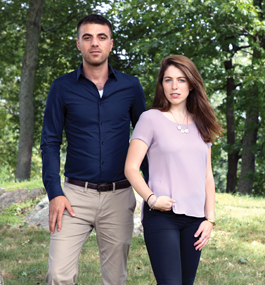
Mike Lovett
Ashraf Awawda and Noa Radosh, YallaTalk
page 4 of 5
While these efforts prepared Awawda for OGS, he sees the program as qualitatively different from others. “I’ve waited a long time to have something like this,” he says. “This [program] isn’t just about peace, about sharing stories. There is action on the ground. OGS opens your mind about what your venture can do.”
When the fellows arrive on campus, their first task is to brainstorm economically feasible startup ideas that address the region’s poverty and lack of resources, and the cultural and economic divide between the two communities. This year’s group of fellows started with 11 potential projects. Within two weeks, they had narrowed that number to seven, and teams were formed for each venture.
Of the seven projects, four will be chosen on Venture Selection Day in mid-July, receiving a combined $200,000 in seed money from OGS.
As the fellows develop business plans for their companies, they take classes with Heller School faculty to sharpen their entrepreneurial skills, and work with mentors. “I wanted all the business people, professors and leaders whom I met here to share their knowledge and experience with Israelis and Palestinians my own age,” Elhelo says.
Sari Rapkin, a retired PricewaterhouseCoopers partner who met Elhelo through her work with CJP, was recruited as a mentor. She was amazed by the students’ collaboration. “The first time I came to campus, I saw how the students had immediately bonded,” she says. “I couldn’t tell Israeli from Palestinian. Everyone was working together with the same purpose.”
Still, the conflict’s shadow can’t be completely avoided, even on the bucolic Brandeis campus. That’s where Daniel Terris, P’08, P’11, P’12, P’15, the director of the university’s International Center for Ethics, Justice and Public Life, comes in. He helps facilitate political dialogue among the fellows.
In the program’s first weeks, there is little time for politics to intrude, Terris says. The teams are deeply focused on developing their startups. But “by the time we have our first large-group meeting, a lot of very charged issues can come up.”
For instance, in summer 2016, after an attack by two gunmen in Tel Aviv’s Sarona Market, “some of the Israelis were upset that the Palestinian fellows had not shown enough sympathy,” Terris says. “At the same time, many Palestinians felt hurt that the Israeli fellows were insensitive to the violence they experienced living under occupation.” Although nothing was finally resolved, “the point is that they’re willing to cooperate with one another, even if they have strong political differences.”
For Elhelo, this anecdote exemplifies the heart of the OGS experience. The fellows’ shared business goals allow them to contain the conflict’s explosive political issues without denying their existence. For once, seemingly insoluble tragedies take second place to positive, achievable goals.
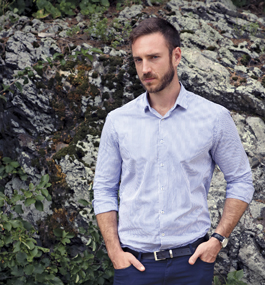
Mike Lovett
Ron Pe'er
page 5 of 5
Not business as usual
Israeli Jew Ron Pe’er takes the stage on Venture Selection Day to pitch RateAd, a mobile app that allows companies to test their ads with customers, who in turn earn money for participating in market research.
The 29-year-old Tel Avivan’s entrepreneurial spirit seems bred in his bones. In college, when he and a few friends wanted to learn Arabic, Pe’er took the lead in finding teachers and organizing lessons. He soon used his experience to create a company that has offered foreign-language instruction to more than 1,000 students. Somehow, he also found the time to start a headhunting company that works with Israel’s top corporations.
Pe’er is thoughtful and articulate, with pensive eyes. He studied international affairs in college and took part in a peace program designed for Israelis and Palestinians. By the end of the program, the students had concluded that Israeli-Palestinian economic cooperation was the key to ending the conflict.
But they assumed that peace would have to be achieved through a high-level political process, not the private actions of individuals. That’s why Pe’er calls OGS “the best program I’ve ever participated in.” His female Palestinian business partner is like him, he says: “stubborn, very direct, but also empathetic. We have developed a great bond. The people here really believe in the future of the region. There are no hidden agendas.”
“For me, the most powerful part of the experience is that faculty, fellows and mentors have shared values regarding equality, social justice and freedom,” says SnapLand’s Agbaria. “Here, when we talk about politics, even if we differ, we do it from these shared values. You’re not afraid to cooperate, so you can bring your full creativity. It’s special. It’s hard to find back home.”
The CEOs, lawyers and venture capitalists Elhelo has carefully assembled to guide and ultimately judge the fellows on Venture Selection Day are an integral part of his vision. “I came to inspire the Boston community about the possibility for coexistence,” he says. “But I was inspired — I was blown away by how many smart, successful people are willing to dedicate so much of their time to philanthropy. It’s as if it’s in their DNA.”
Today in Boston, every presentation draws loud applause. But encouragement quickly gives way to incisive questions about each startup’s details. Audience members ask about customer demographics, timelines for financial viability and potential competitors. As the final pitch ends, Elhelo and his team of advisers collect the voting ballots handed out earlier in the day. Fellows whose startups are not selected will be given the opportunity to join the teams awarded seed money.
Of course, even the winning teams are not guaranteed success. Creating lasting cooperation carries extra burdens. Joint Palestinian-Israeli companies will have to negotiate the region’s geopolitics as well as its fractured marketplace. Israelis may not enter the West Bank without a permit; the same is true of Palestinians entering Israel.
The ballots are reviewed, and the winners are announced, SnapLand and YallaTalk among them. Another startup, Solar Box, also gets the nod. It hopes to provide loans to individuals who want to buy solar panels; a single panel can provide electricity for an entire family in Gaza, with power left over to sell back to the grid. The fourth successful team is Leaves of Canaan, which plans to work with Palestinian women to produce herbal teas for the international market.
RateAd does not make the cut. But don’t count Pe’er out. This successful young businessman is committed to creating a better future for both Israelis and Palestinians. “For Jews to build a Jewish and democratic state in Israel, economic cooperation with a future state of Palestine is a necessity,” he says.
As OGS is proving, Elhelo’s long-term calculation has a brilliant simplicity. “When Israelis and Palestinians work together,” Elhelo says, “in the end we are both stronger.”
Joseph Dorman is a documentary filmmaker and co-director of “Colliding Dreams,” a history of Zionism.
